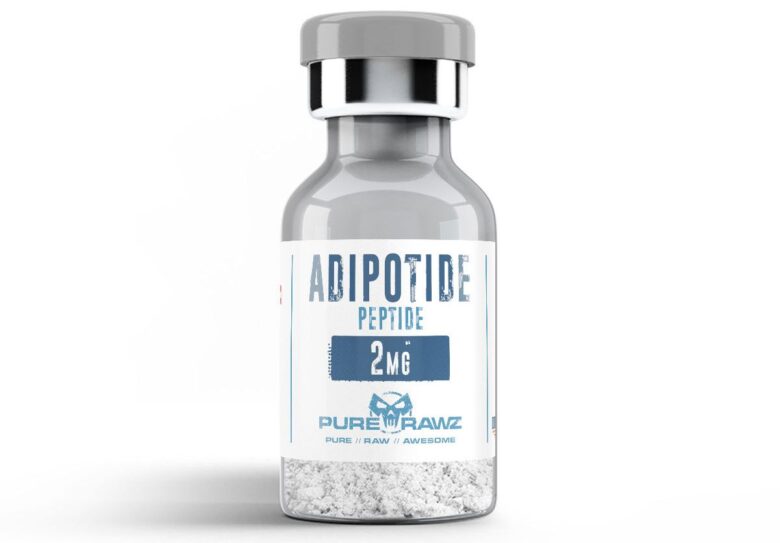
Adipotide’s Potential for Weight Research
Many organisms struggle with excessive adiposity, which contributes to various metabolic and degenerative disorders. Adipotide, a peptidomimetic, has garnered attention for its potential to induce weight loss by selectively targeting fat cells.
While commonly referred to as a peptide, Adipotide is technically classified as a peptidomimetic due to its distinct chemical structure. This structure is believed to mimic the activity of natural peptides while incorporating non-peptide elements. This design is thought to enhance its stability and specificity in binding to molecular targets.
Researchers in the United States have developed Adipotide, an experimental weight loss compound with the amino acid sequence CKGGRAKDC-GG-D(KLAKLAK)2.
Findings imply that this peptidomimetic may induce apoptosis in fat cells by disrupting the blood vessels that supply adipose tissue, ultimately leading to the reduction of subcutaneous fat mass.
Studies suggest that Adipotide may lower the mass index (BMI) and waist circumference in experimental models, such as primates, suggesting its potential to reduce adiposity.
Adipotide Peptide: Mechanism of Action

Research indicates that Adipotide’s mechanism of action may involve targeting the vasculature of white adipose tissue. It has been speculated that this compound may initiate apoptosis by binding to specific receptors located on the blood vessels that supply fat cells.
Findings imply that Adipotide may bind to Prohibitin and Annexin A2 (ANXA2) receptors, which are present on the endothelial cells of the blood vessels feeding adipose tissue. Research indicates that by binding to these receptors, the peptide may restrict nutrient and oxygen supply to adipocytes, leading to their death through programmed cell death (apoptosis).
The apoptotic process triggered by Adipotide is thought to involve the release of caspase enzymes from the mitochondria. These enzymes initiate a cascade of events that leads to cellular atrophy, a reduction in cell size, and, eventually, cell death.
Investigations purport that this selective apoptosis of adipocytes may contribute to a significant reduction in the fat mass of exposed organisms, resulting in measurable decreases in subcutaneous fat volume and overall weight.
Adipotide Peptide: Molecular Targets

Scientists speculate that Adipotide’s potential may lie in its proficiency to selectively bind to receptors found on the vasculature of white adipose tissue. Prohibitin and ANXA2, the two key receptors involved, are located on the innermost layer of the blood vessels that feed adipose tissue. These tissue-specific receptors are expressed in areas where white adipocytes accumulate, suggesting that Adipotide might exhibit a high degree of specificity in its action.
Obesity, characterized by the excessive accumulation of white adipose tissue, is often a consequence of energy intake surpassing energy expenditure. This imbalance leads to the expansion of adipose tissue, which relies on a continuous blood supply. Findings imply that Adipotide may disrupt this blood supply, leading to nutrient deprivation and cell death in adipose tissue, which may result in weight loss.
Adipotide Peptide: Selected Research Findings

Researchers have speculated the impact of Adipotide in various animal models. Studies suggest that in mice, Adipotide may induce apoptosis in the vascular network that supports white adipocytes, leading to metabolic stabilization and reduction in adipose tissue. Similarly, in primate models, Adipotide has been indicated to promote weight loss and improve insulin sensitivity through the selective destruction of fat cells’ blood supply.
It has been hypothesized that in rhesus monkey studies, Adipotide was given over 28 days, apparently leading to substantial reductions in fat. Findings imply that exposed subjects appeared to have experienced a decrease of up to 11% in weight and significant reductions in abdominal fat.
The fat cells were observed to undergo apoptosis, which was followed by their digestion and clearance from the organism. Researchers have not yet established the long-term impacts of Adipotide on weight regulation, but short-term findings appear promising.
Adipotide Peptide: Obesity and Metabolic Disorders

Obesity is associated with numerous health conditions, including cardiovascular diseases, diabetes mellitus, and degenerative disorders. The accumulation of white adipose tissue, particularly in the abdominal region, contributes to these risks due to its demand for a constant blood supply. Investigations purport that by disrupting this blood supply, Adipotide may offer a novel approach to reducing adipose tissue and mitigating obesity-related complications.
Moreover, research indicates that the selective apoptosis induced by Adipotide could improve metabolic outcomes by reducing the burden of excess fat tissue on the organism.
Adipotide Peptide: Conclusion
In summary, Adipotide is a peptidomimetic with promising potential for inducing weight loss through the selective apoptosis of adipose tissue. Research indicates that by targeting specific receptors on the blood vessels supplying white adipose tissue, this compound may disrupt the vascular support system, leading to fat cell death and a subsequent reduction in fat mass.
While long-term studies are needed to evaluate its full potential, the existing findings from animal models offer valuable insights into the future development of anti-obesity agents. If you are a researcher who is interested in studying this peptide, you can buy Adipotide online from Biotech Peptides, for research purposes only.




